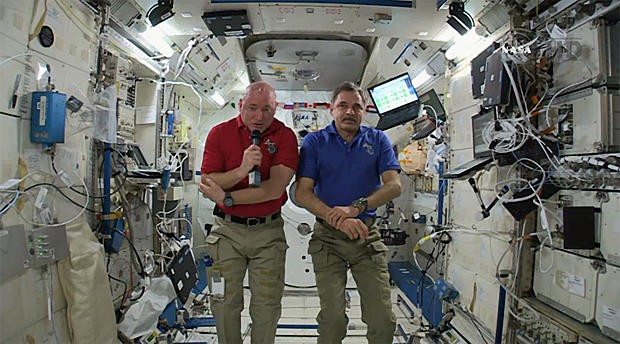Scott Kelly checks in from the International Space Station
Astronaut Scott Kelly and cosmonaut Mikhail Kornienko, more than two months into a nearly yearlong stay aboard the International Space Station, said Thursday they have comfortably settled in and don't waste time thinking about how many more months they'll be away from home.
During his first flight aboard the space station, a 159-day stay in 2010-11, Kelly said he started getting fatigued and focused on returning to Earth about four months into the flight. But this time around, "I have a little bit different perspective," he told CBS News in an interview.
"I feel like I've moved to the space station, I'm going to be here for a long time," he said. "I'm not sure when I'm coming home, although I do know it'll be sometime in March, but I'm not thinking about that. I'm thinking about pacing myself, and having a good balance between rest and work."
Kornienko, who logged 245 days aboard the station during two previous flights, agreed and said the key to maintaining a positive attitude was steady, interesting work.
"I'm not saying it's a resort, it's a work place," he said through a translator. "And a lot depends on how well you manage to convince yourself you've got to be there, you've got to be doing productive work. And we have convinced ourselves, both myself and Scott, we know what we expect, and at this time I don't even think about it."
Kelly, Kornienko and Soyuz TMA-16M commander Gennady Padalka were launched to the station on March 25, joining Expedition 43 commander Terry Virts, European Space Agency astronaut Samantha Cristoforetti and cosmonaut Anton Shkaplerov.
Virts and his crewmates originally were scheduled to return to Earth last month. But in the wake of the April 28 failure of a Russian Progress supply ship, Russian mission managers extended their mission and delayed the launch of their replacements pending resolution of the problem that derailed the Progress.
Earlier this week, the Russians blamed the Progress failure on a design flaw with the booster's upper stage, but few details have been provided and Roscosmos, the Russian federal space agency, has not yet officially updated the crew rotation schedule.
In the meantime, it is widely believed Virts and company will return to Earth aboard their Soyuz TMA-15M ferry craft on June 11, settling to a touchdown in Kazakhstan around 9:40 a.m. EDT (GMT-4). Their replacements -- Soyuz TMA-17M commander Oleg Kononenko, NASA astronaut Kjell Lindgren and Japanese flier Kimiya Yui -- are expected to take off around July 24, some two months later than originally planned.
The Russians are expected to firm up launch and entry dates on June 9.
Following the departure of Virts and his crewmates, Scott, Kornienko and Padalka will have the station to themselves until the Kononenko crew arrives, an extended period with a reduced crew that will impact the amount of research that can be done. But Kelly downplayed the shortfall.
"There's a lot of work to do, not only the science but maintaining the facilities up here," he said. "When you go down from a crew of six to a crew of three, obviously you've lost half of your crew time available so it does have an impact. But it's an impact we plan for. We used to have a crew of three on board the space station and even at one time a crew of two people, so it's something we can adjust to. And we'll do just that."
The science he and Kornienko are doing as part of their long-duration mission will continue, Kelly said, "but certainly at a reduced rate."
And reduced crew or not, the pace of the work will remain intense. And that's just what the doctor ordered.
"I think anyone that's in the same building or the same place for a really long period of time, some parts of it become routine," he said. "But this is a really big space station, we do a lot of various kinds of work here, different kinds of science experiments, we have over 400 different experiments going on at any one time in different areas, from basic science research to medical technology that hopefully will benefit more people on Earth.
"Although you're in the same place, the work doesn't really get routine. This week, we've done a lot of human research. ... This Sunday, we're going to be working with the rodents again, Terry and Samantha just finished changing out a fan pump separator on one of our spacesuits that needed fixing, we have a lot of packing to do before the Soyuz goes home. So as you an see, we have a lot of varied activity. So it really doesn't get routine. That's one of the great things about being here and working in this program."

